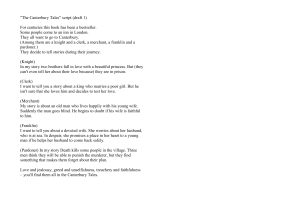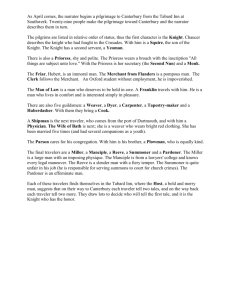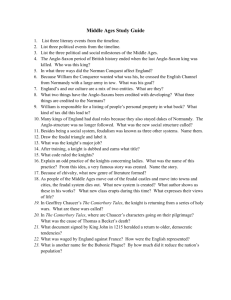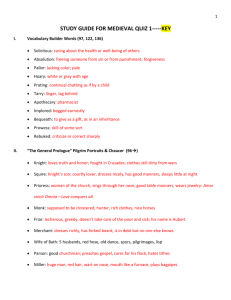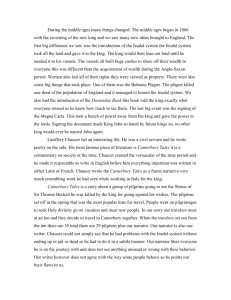Self-reflexivity in Homer, Chaucer, Cervantes
advertisement
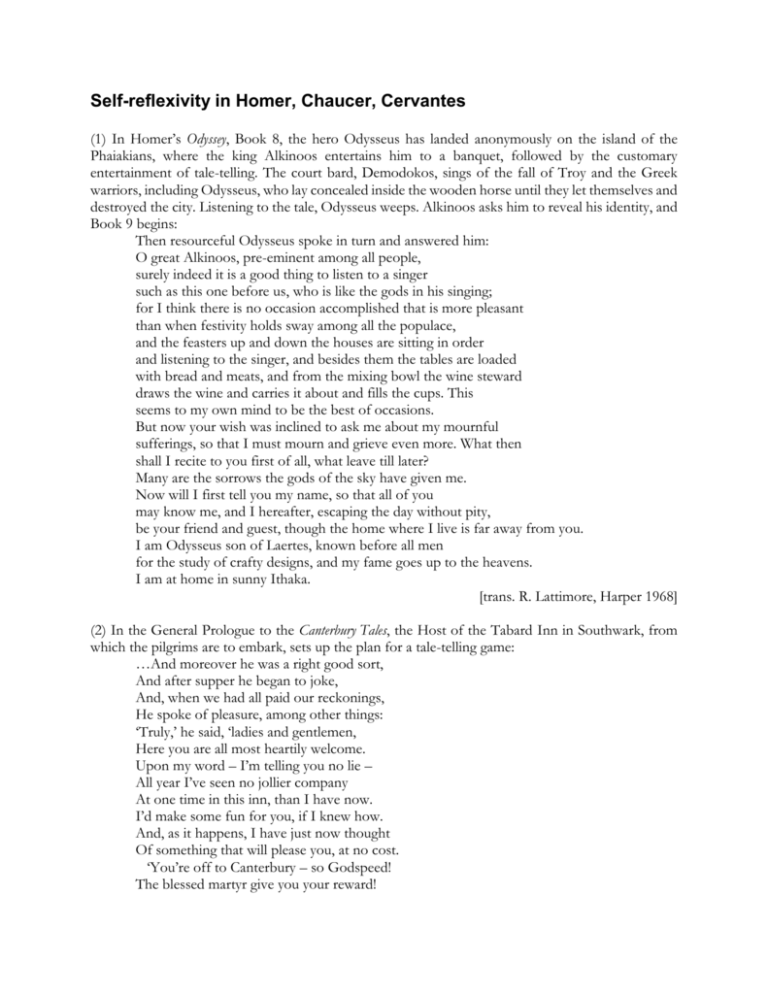
Self-reflexivity in Homer, Chaucer, Cervantes (1) In Homer’s Odyssey, Book 8, the hero Odysseus has landed anonymously on the island of the Phaiakians, where the king Alkinoos entertains him to a banquet, followed by the customary entertainment of tale-telling. The court bard, Demodokos, sings of the fall of Troy and the Greek warriors, including Odysseus, who lay concealed inside the wooden horse until they let themselves and destroyed the city. Listening to the tale, Odysseus weeps. Alkinoos asks him to reveal his identity, and Book 9 begins: Then resourceful Odysseus spoke in turn and answered him: O great Alkinoos, pre-eminent among all people, surely indeed it is a good thing to listen to a singer such as this one before us, who is like the gods in his singing; for I think there is no occasion accomplished that is more pleasant than when festivity holds sway among all the populace, and the feasters up and down the houses are sitting in order and listening to the singer, and besides them the tables are loaded with bread and meats, and from the mixing bowl the wine steward draws the wine and carries it about and fills the cups. This seems to my own mind to be the best of occasions. But now your wish was inclined to ask me about my mournful sufferings, so that I must mourn and grieve even more. What then shall I recite to you first of all, what leave till later? Many are the sorrows the gods of the sky have given me. Now will I first tell you my name, so that all of you may know me, and I hereafter, escaping the day without pity, be your friend and guest, though the home where I live is far away from you. I am Odysseus son of Laertes, known before all men for the study of crafty designs, and my fame goes up to the heavens. I am at home in sunny Ithaka. [trans. R. Lattimore, Harper 1968] (2) In the General Prologue to the Canterbury Tales, the Host of the Tabard Inn in Southwark, from which the pilgrims are to embark, sets up the plan for a tale-telling game: …And moreover he was a right good sort, And after supper he began to joke, And, when we had all paid our reckonings, He spoke of pleasure, among other things: ‘Truly,’ he said, ‘ladies and gentlemen, Here you are all most heartily welcome. Upon my word – I’m telling you no lie – All year I’ve seen no jollier company At one time in this inn, than I have now. I’d make some fun for you, if I knew how. And, as it happens, I have just now thought Of something that will please you, at no cost. ‘You’re off to Canterbury – so Godspeed! The blessed martyr give you your reward! And I’ll be bound, that while you’re on your way, You’ll be telling tales, and making holiday; It makes no sense, and really it’s no fun To ride along the road dumb as a stone. And therefore I’ll devise a game for you, To give you pleasure, as I said I’d do. And if with one accord you all consent To abide by my decision and judgement, And if you’ll do exactly as I say, Tomorrow, when you’re riding on your way, Then, by my father’s soul – for he is dead – If you don’t find it fun, why, here’s my head! Now not another word! Hold up your hands!’ We were not long in making up our minds. It seemed not worth deliberating, so We gave our consent without more ado, Told him to give us what commands he wished. ‘Ladies and gentlemen,’ began our host, ‘Do yourselves a good turn, and hear me out: But please don’t turn your noses up at it. I’ll put it in a nutshell: here’s the nub: It’s that you each, to shorten the long journey, Shall tell two tales en route to Canterbury, And, coming homeward, tell another two, Stories of things that happened long ago. Whoever best acquits himself, and tells The most amusing and instructive tale, Shall have a dinner, paid for us all, Here in this inn, and under this roof-tree, When we come back again from Canterbury…’. [trans. David Wright, Oxford 1986] (3) The opening chapter of Cervantes’ The Adventures of Don Quixote explains how the hero’s reading-habits influence him to set off on his travels: In a village of La Mancha, the name of which I have no desire to call to mind, there lived not long since one of those gentlemen that keep a lance in the lance rack, an old buckler, a lean hack, and a greyhound for coursing. An olla of rather more beef than mutton, a salad on most nights, scraps on Saturdays, lentils on Fridays, and a pigeon or so extra on Sundays, made away with three-quarters of his income. The rest of it went in a doublet of fine cloth and velvet breeches and shoes to match for holidays, while on week-days he made a brave figure in his best homespun. He had in his house a housekeeper past forty, a niece under twenty, and a lad for the field and market-place, who used to saddle the hack as well as handle the bill-hook. The age of this gentleman of ours was bordering on fifty; he was of a hardy habit, spare, gaunt-featured, a very early riser and a great sportsman. They will have it his surname was Quixada or Quesada (for here there is some difference of opinion among the authors who write on the subject), although from reasonable conjectures it seems plain that he was called Quexana. This, however, is of but little importance to our tale; it will be enough not to stray a hair's breadth from the truth in the telling of it. You must know, then, that the above-named gentleman whenever he was at leisure (which was mostly all the year round) gave himself up to reading books of chivalry with such ardour and avidity that he almost entirely neglected the pursuit of his field-sports, and even the management of his property; and to such a pitch did his eagerness and infatuation go that he sold many an acre of tillageland to buy books of chivalry to read, and brought home as many of them as he could get. But of all there were none he liked so well as those of the famous Feliciano de Silva's composition, for their lucidity of style and complicated conceits were as pearls in his sight, particularly when in his reading he came upon courtships and cartels, where he often found passages like "the reason of the unreason with which my reason is afflicted so weakens my reason that with reason I murmur at your beauty;" or again, "the high heavens, that of your divinity divinely fortify you with the stars, render you deserving of the desert your greatness deserves." Over conceits of this sort the poor gentleman lost his wits, and used to lie awake striving to understand them and worm the meaning out of them… Many an argument did he have with the curate of his village (a learned man, and a graduate of Siguenza) as to which had been the better knight, Palmerin of England or Amadis of Gaul. Master Nicholas, the village barber, however, used to say that neither of them came up to the Knight of Phoebus, and that if there was any that could compare with him it was Don Galaor, the brother of Amadis of Gaul, because he had a spirit that was equal to every occasion, and was no finikin knight, nor lachrymose like his brother, while in the matter of valour he was not a whit behind him. In short, he became so absorbed in his books that he spent his nights from sunset to sunrise, and his days from dawn to dark, poring over them; and what with little sleep and much reading his brains got so dry that he lost his wits. His fancy grew full of what he used to read about in his books, enchantments, quarrels, battles, challenges, wounds, wooings, loves, agonies, and all sorts of impossible nonsense; and it so possessed his mind that the whole fabric of invention and fancy he read of was true, that to him no history in the world had more reality in it. He used to say the Cid Ruy Diaz was a very good knight, but that he was not to be compared with the Knight of the Burning Sword who with one back-stroke cut in half two fierce and monstrous giants. He thought more of Bernardo del Carpio because at Roncesvalles he slew Roland in spite of enchantments, availing himself of the artifice of Hercules when he strangled Antaeus the son of Terra in his arms. He approved highly of the giant Morgante, because, although of the giant breed which is always arrogant and ill-conditioned, he alone was affable and well-bred. But above all he admired Reinaldos of Montalban, especially when he saw him sallying forth from his castle and robbing everyone he met, and when beyond the seas he stole that image of Mahomet which, as his history says, was entirely of gold. To have a bout of kicking at that traitor of a Ganelon he would have given his housekeeper, and his niece into the bargain. In short, his wits being quite gone, he hit upon the strangest notion that ever madman in this world hit upon, and that was that he fancied it was right and requisite, as well for the support of his own honour as for the service of his country, that he should make a knight-errant of himself, roaming the world over in full armour and on horseback in quest of adventures, and putting in practice himself all that he had read of as being the usual practices of knights-errant; righting every kind of wrong, and exposing himself to peril and danger from which, in the issue, he was to reap eternal renown and fame. Already the poor man saw himself crowned by the might of his arm Emperor of Trebizond at least; and so, led away by the intense enjoyment he found in these pleasant fancies, he set himself forthwith to put his scheme into execution… [trans. John Ormsby, 1885] Questions/views. “Ulysses or Robin Hood, kings or king’s sons or knightly aristocrats fallen on evil days, when they triumph over their enemies will restore a society of the Just in which their true identity will be revealed. But is it the same identity as before?… If Ulysses is a hoaxer, the entire account he gives to the kind of the Phaeacians might be a pack of lies.” [Calvino, pp.140ff.] Tale-telling as a highly-valued social activity v. tale-telling as a potential deception and a distraction from serious life. If fictional stories are one of the ways in which a society embodies its central values, what happens when a story deliberately draws attention to the fact that it isn't true? Do we need heroes so much that we lose sight of whether they are real or not? Oral culture v. print culture -- at what point do we become sceptical about the fictionality of fiction, rather than taking pleasure in it? (Ways in which new technologies of communication might figure here?) Suggested writing exercises. A story where a famous hero reveals himself to a group of people, and tells his story. A story where a well-known liar tells a group of people about his adventures. A tale-telling game played out among a group of travellers. A story based on the that explores the difference between the serious/sacred uses of story-telling and the pleasurable ones. A story where the central character has been driven mad by books. A story where the central character can't distinguish between fictional stories and historical facts. A story whose central character sets out to be the kind of hero he likes to read about. A story whose central character is a victim of new technologies of communication.

